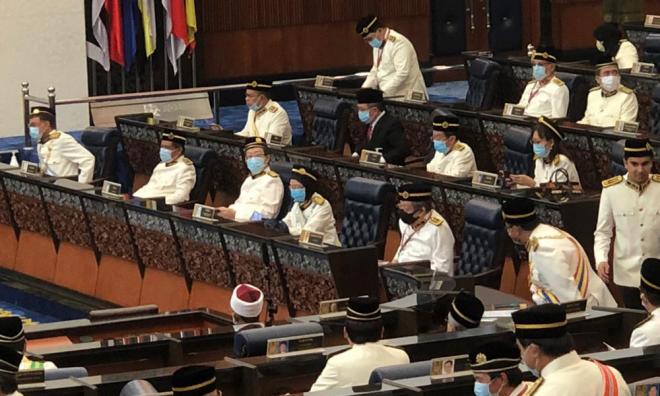
As we all know, Parliament hasn’t been able to function since Prime Minister Muhyiddin Yassin and his supporters wrested power from Pakatan Harapan in late February.
The last parliamentary sitting proved undoubtedly that Muhyiddin's government didn’t want the legislature to be a crucial check-and-balance on the executive.
Worse, it was a waste of taxpayers' money when the one-day sitting on May 18 had only one item on the agenda – the Yang di-Pertuan Agong’s address. MPs didn’t even get a chance to debate the royal address and pass the motion of thanks.
Indeed, with his refusal to use online platforms to convene a proper parliamentary sitting, Muhyiddin acts like he’s stuck in the 14th century. That was the last time the British Parliament legitimately could not meet because of the bubonic plague and because there was no Zoom.
The question, however, is what about the Opposition? Unfortunately, Harapan isn’t doing very much either to ensure Parliament’s vitality.
Here is a sample of what I mean. Veteran politician Lim Kit Siang complains, “How long will Parliament be hijacked?” Klang MP Charles Santiago laments that as a lawmaker, he feels “robbed” of his voice to ask about “legitimate and crucial issues in Parliament”. And former science minister Yeo Bee Yin has told successor Khairy Jamaluddin it doesn’t take rocket science to set up a virtual sitting for Parliament.
These are all legitimate views. But Harapan MPs need to be doing much more. They should be leading the way by adopting technology for their respective state legislatures in Penang, Selangor, Negeri Sembilan and Sabah, and/or agreeing to virtual meetings for Parliament. Instead, however, they have been playing the helpless victim by complaining, or righteous persecutor by painting their opponents as villains.
Indeed, Harapan has failed to do exactly what they accuse Perikatan Nasional (PN) of refusing to do.
This is despite the fact that Bersih 2.0 offered to organise a three-day virtual parliamentary sitting from May 19 to May 21 so that MPs could debate the Agong’s speech and pass a motion of thanks. Admittedly, this virtual sitting would have been unofficial. However, it would have exposed Muhyiddin’s flimsy excuse that MPs needed to be blocked from performing their duties because of the coronavirus.
Clearly, Bersih’s offer wasn’t taken up. Most disappointingly, we didn’t even hear any MP from Harapan, or those from Bersatu opposed to Muhyiddin’s backdoor government, publicly support the idea.
While it is expected that PN MPs would not have taken up the offer, why is it that we didn’t hear Opposition MPs support the proposal? Wouldn’t that have shown that Opposition MPs were better than their PN counterparts?
The Opposition MPs’ silence and lack of action on holding a virtual sitting begs the question: are they also stuck in the 14th century, like Muhyiddin?
Granted, the three proposed Bersih dates have now gone by, and there was Ramadan and Hari Raya Aidilfitri. However, the point remains. Are our Opposition MPs interested in revitalising Parliament or not?
If they were, they would have, at the very least, discussed other dates with Bersih or better still, organised their own virtual sitting. After all, it’s not rocket science.
The fact is that the next parliamentary meeting is scheduled to begin on July 13, for 25 days. However, there is no guarantee that meeting won’t be postponed, just as Muhyiddin (below) postponed the earlier March 9 sitting by 10 weeks, to May 18.
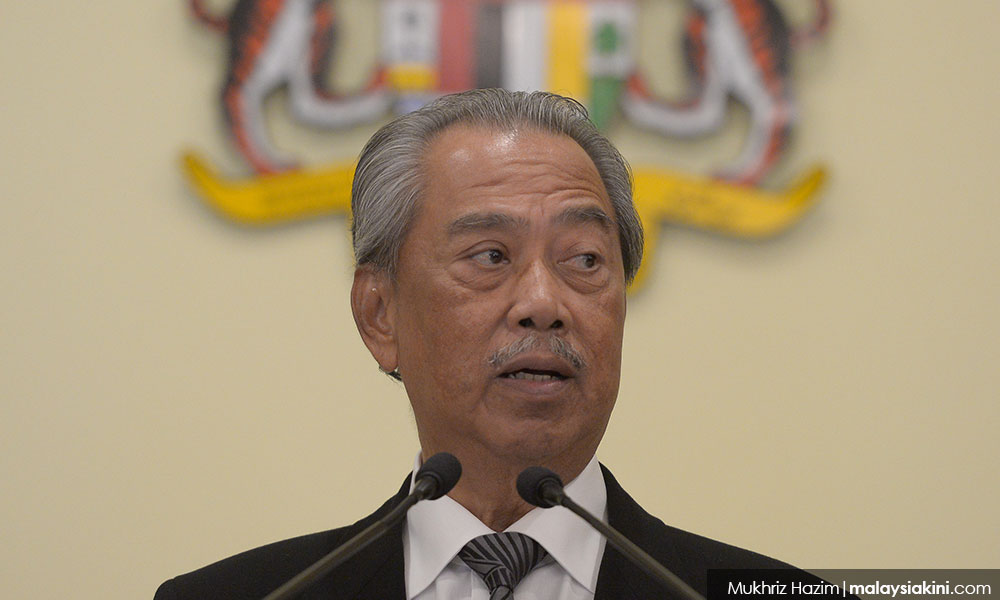
Indeed, if Muhyiddin’s support in Parliament remains questionable, come July, and he stays insecure, he will likely postpone the next meeting to Sept 28 when Parliament is scheduled to debate the 2021 Budget. In fact, he can postpone it up till November because the Constitution allows him a six-month gap between one sitting to the next.
And so, if the next meeting is postponed to November, and if Muhyiddin pulls another fast one by limiting it to a one-day sitting, what would that mean? It would mean that the nation’s highest elected body would only have been in session for two out of 365 days.
Critically, there is much more at stake than Parliament sitting to pass laws or to approve the government’s budget for 2021. There is also the role of parliamentary select committees.
What are parliamentary select committees and why should we care? A select committee comprises members and chairpersons from the government backbench and from the Opposition. These committees are given specific terms of reference to investigate and report back to Parliament.
Their reports are published. This keeps the public informed and can certainly place much-needed pressure on the executive. Hence, select committees are one critical way to keep tabs on the executive and how it is using taxpayer's money.
These committees are also important because they ensure there is specialisation among MPs so that Parliament becomes more effective in studying bills or scrutinising ministries. In Malaysia, committees which study specific bills or issues can also conduct public hearings and summon witnesses.
Our Parliament has always had five standing select committees: selection; public accounts; standing orders; house; and privileges. When it was in power, Harapan set up 10 special select committees as follows, as part of its election manifesto to reform Parliament:
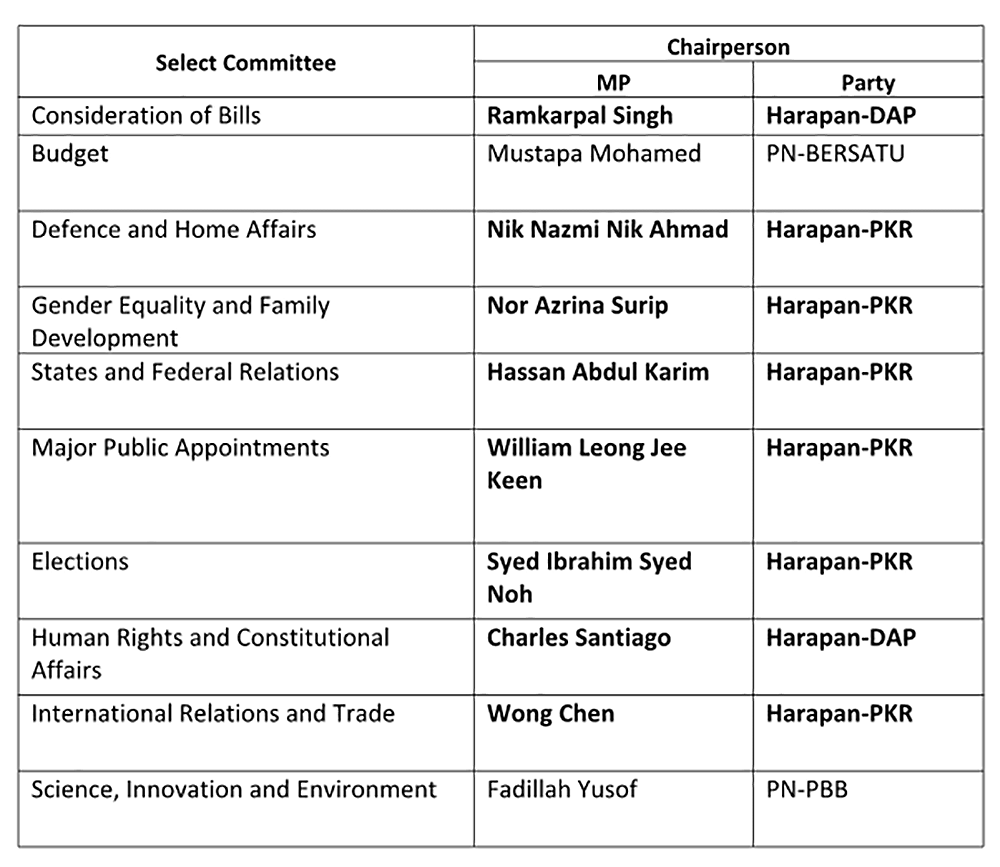
Because of the change in government, these committees need to be reshuffled. There is also the possibility that the number of select committees under PN will be reduced so as to limit parliamentary scrutiny of the executive.
Luckily, Harapan still chairs eight out of these select committees. Because there was only one item on the agenda during the May 18 sitting, these committees could not be reshuffled then. However, the Harapan chairs are expected to be replaced once Parliament is reconvened.
What’s important to remember is that these committees are not constrained by whether Parliament is in session or not. They are able to meet and continue functioning for so long as they are not barred by the Speaker.
So what can Harapan do, apart from pointing fingers and playing the victim? There is an opportunity, via virtual meetings, for these eight Harapan chairpersons to thwart Muhyiddin and revitalise Parliament.
For example, instead of complaining his voice has been “robbed”, Santiago (below) could convene a virtual meeting of the Human Rights and Constitutional Affairs select committee. Why hasn’t he?
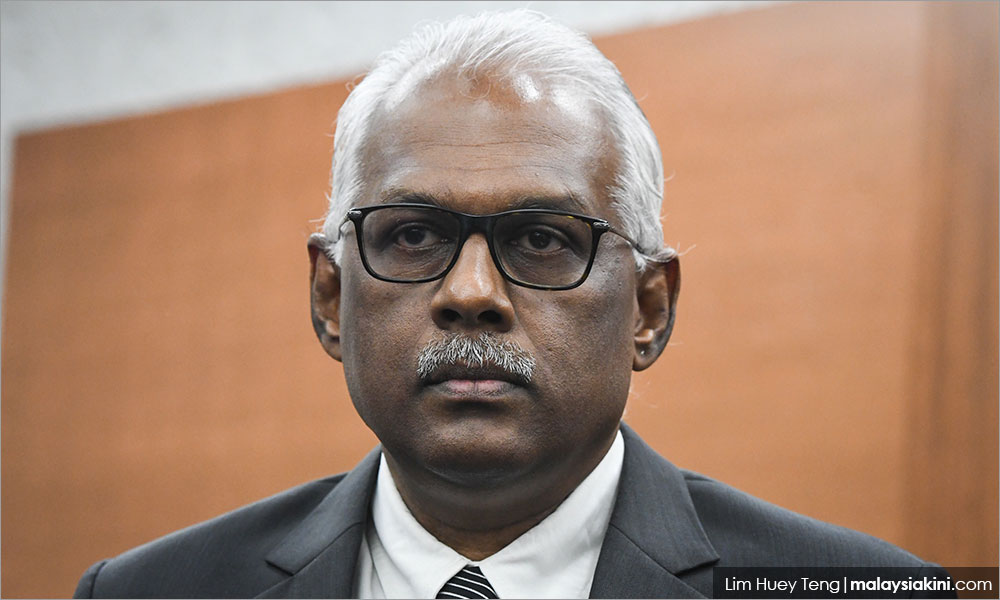
Virtual meetings would allow these select committees to conduct public hearings, summon witnesses and scrutinise the executive. If this happens, the months before the next sitting won’t go to waste. And MPs from across parties would be doing the job that taxpayers are paying them for, instead of politicking and engaging in a fishing expedition to see which coalition can seduce the most number of MPs to their side.
Admittedly, the Speaker of Parliament has instructed the select committees to stop all activities, citing the movement control order (MCO) to curb the pandemic. Certainly, nobody is asking any MP to violate the MCO. And the good news is, virtual meetings would ensure Parliament is able to function despite the power grab and despite a pandemic.
I’d like to see the Harapan MPs who currently chair these eight select committees petition the Speaker to lift his ban on meetings if they are held remotely. Indeed, this would also be an opportunity for citizens to find out just what kind of Speaker we have – one who is also stuck in the 14th century, or one who will demonstrate 21st-century leadership.
And even if the Speaker refuses to lift the ban, what is stopping the eight Harapan MPs from defying it? Now, that would be demonstrating leadership at a time of political crisis.
I think most of us can agree that one measure of maturity and leadership is what someone does when they can’t have what they want. For example, more than 76,000 people signed a petition to cry foul at the May 18 one-day sitting because we weren’t getting what our democracy deserved.
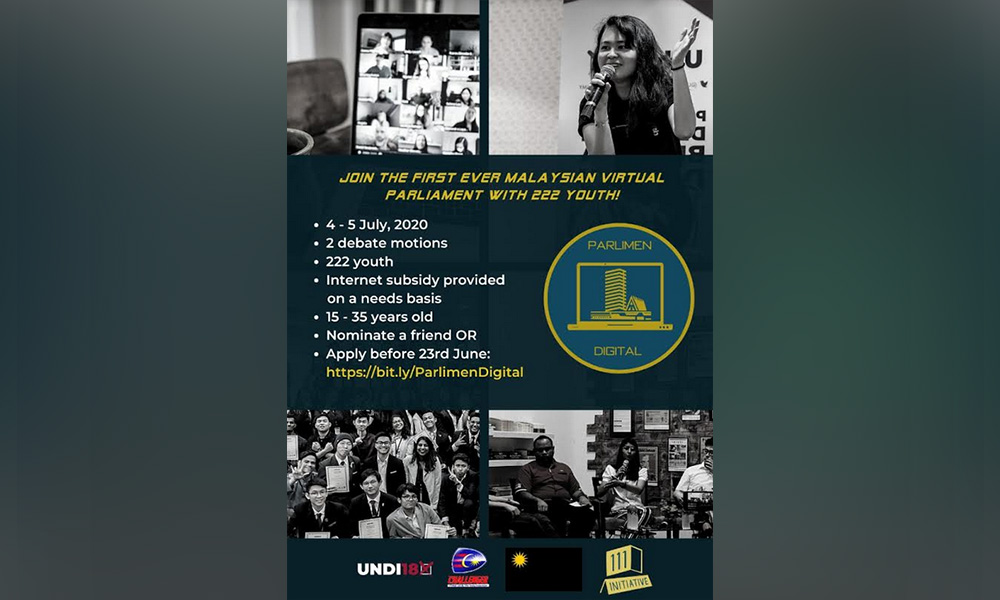
At the same time, a lawyer and a social activist are mounting a legal challenge against the prime minister and the Dewan Rakyat Speaker for that Parliament sitting. And the nation’s first virtual Parliament with 222 youths is scheduled for July 4 and July 5. The organisers’ main goal? To show that it is entirely possible to hold a virtual session of Parliament.
The Opposition, too, isn’t currently getting what they want. My question is, what are they going to do about it? Play victim and persecutor while seducing political turncoats? Or show leadership and uphold parliamentary democracy worthy of 21st century Malaysians?
JACQUELINE ANN SURIN is an online trainer and facilitator, a Drama@Work consultant, and a leadership coach. She was an award-winning columnist, a journalist for 20 years, and the co-founder of The Nut Graph before switching careers. - Mkini


No comments:
Post a Comment
Note: Only a member of this blog may post a comment.